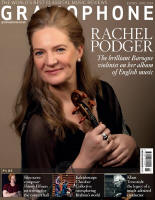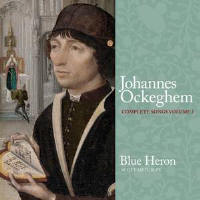Texte paru dans: / Appeared in:
|
|
 |
|
|
This completes Blue Heron’s two-disc set of Ockeghem’s complete songs (1/20), coming just four years after the parallel collection from Cut Circle (Musique en Wallonie, 1/21). To say that Ockeghem composed some of the loveliest songs of the 15th century seems almost a cliché. But Scott Metcalfe and his musicians confirm that in spades. Just listen to Ma bouche rit or Presque transi to convince yourself.
Like the set from Cut Circle, this is beautifully packaged, with full translations, a long essay by Sean Gallagher and essays by Metcalfe himself both on the scoring of the songs and on the spelling of Ockeghem (which we will all continue to use, since all editions and books about him spell it that way, but it should really be Okeghem). The essay on scoring points to the main difference between these two supremely impressive American groups:
Cut Circle do everything with voices only, whereas Blue Heron distinguish between lines that seem obviously planned for voices and those that pose problems with text-setting and are better done with an instrument – a distinction that is surprisingly easy to make in this particular music.
Slowly, people are becoming more aware of which songs are probably not by Ockeghem. One case here is the version of the lovely Je n’ay dueil found only in a Florentine manuscript from after his death. Metcalfe brings in a brass group to perform that but makes it clear that he thinks this is a version by another hand (and is planning to publish an article saying why: all strength to him). Another song that worries me is the four-voice arrangement of Cornago’s ¿Qu’es mi vida?: they give such a stunning performance of the Cornago that you find yourself wondering why Ockeghem bothered and why he discarded so many gorgeous details of the original.
The only surprise among these two sets is that they nowhere try to realise the various proposals for curtailing the rondeau form suggested by Howard Mayer Brown and Allan Atlas over 25 years ago, particularly as there is a classic example of such curtailment in Ockeghem’s astonishingly original L’autre d’antan. That is only to say that there is room for many further versions of Ockeghem’s songs, but that these two versions set a formidable standard.
|
|




